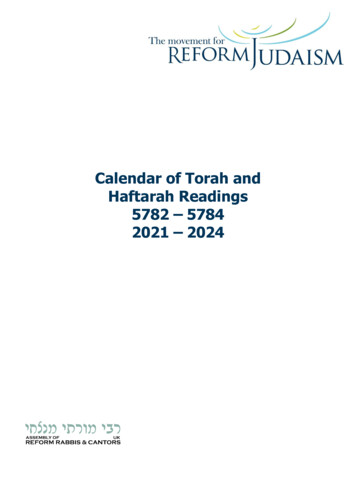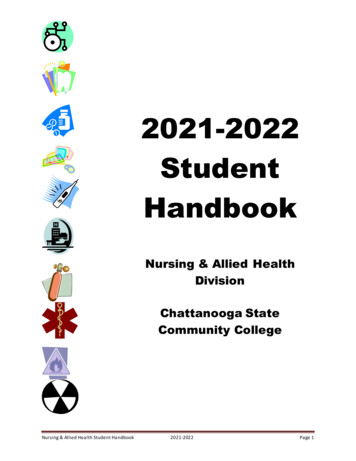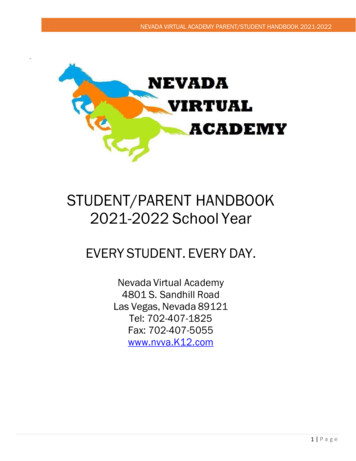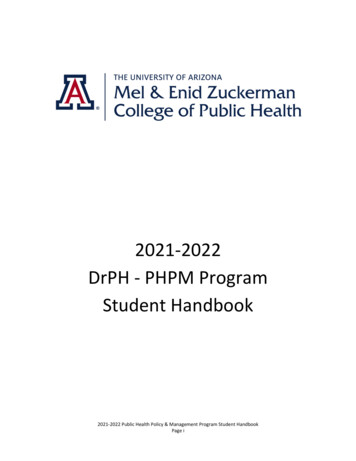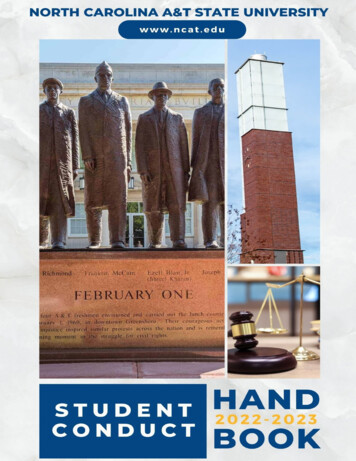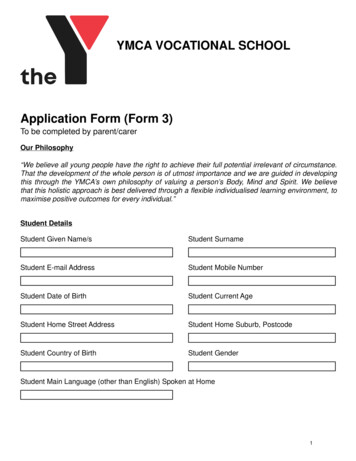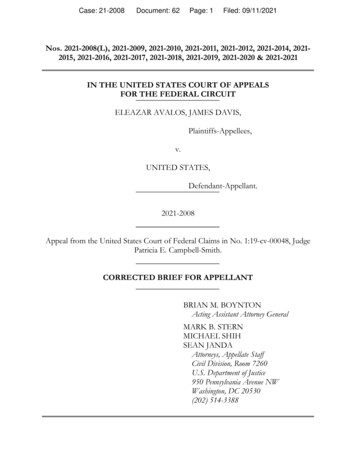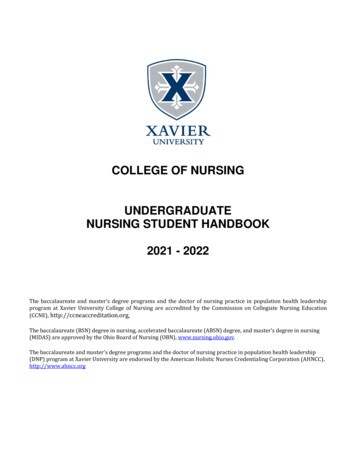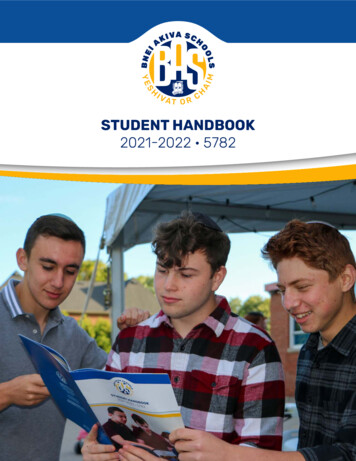
Transcription
STUDENT HANDBOOK2021-2022 · 5782
TABLE OF CONTENTS3MISSION STATEMENT4WELCOME FROM RABBI GRAUER7CONTACT DETAILS8TEFILLA AND SCHEDULE9STUDENT EXPECTATIONS14ATTENDANCE16CURRICULAR REQUIREMENTS18EMERGENCY INSTRUCTIONS: FIRE DRILL21CO-CURRICULAR ACTIVITIES23STUDENT COUNCIL AND YEARBOOK2YESHIVAT OR CHAIMSTUDENT HANDBOOK 2021-2022
MISSION STATEMENTThe mission of Yeshivat Or Chaim is to inculcate within our students anappreciation for and a commitment to Torah observance and values.Yeshivat Or Chaim, founded in 1973, was established in Toronto with severalspecific goals in mind: To create a yeshiva environment where religiously committed Jewish boyswill be able to grow intellectually, socially, emotionally, and religiously in avibrant Jewish setting.To offer a dual curriculum of Judaic and General Studies that will arm ourstudents with the methodological tools needed to become self-reliant inclassical Jewish texts and give them a broad-based secular grounding in theclassical world disciplines. To deepen and strengthen the centrality of Eretz Yisrael and Medinat Yisraelas a fundamental element of our Torah beliefs and to this end, to stress theimportance of lashon hakodesh as a manner of achieving these goals. To encourage and fervently support the notion of our students continuingtheir Judaic studies at yeshivot in Eretz Yisrael and in other institutions ofhigher Jewish learning.PresidentAaron AmesChairMoishe KestenVice PresidentMordechai Katzman (’92)TreasurerEzra LauterpachtSecretaryJonathan StrausExecutive OfficerHadassa Pertman (’04)Immediate Past PresidentHoward WassermanPast PresidentsNachman Sokol ז״ל Saul KoschitzkyEli RubinsteinI. Berl NadlerNaftali WinterJeff ShumacherSteve MayerBoard of DirectorsAhuva EdellAlon KronenbergRuthie MammonJoel MuscatDevora PaskowitzDan RabinovitchTalia Samson (’96)Aryeh Samuel (’08)Sendy Shorser (’05)Marcia Shumacher (’82)Jeremy Silver (’05)Shana Strauss (’91)Life MembersAron Frankel ז״ל Henry KoschitzkySaul KoschitzkyMichael LaxBessie Orfus ז״ל Kurt RothschildPhil SchwartzJack Weinbaum ז״ל YESHIVAT OR CHAIMSTUDENT HANDBOOK 2021-20223
WELCOME FROM RABBI GRAUERDear Students,Rabbi Jonathan Sacks zt”l explained that after their nighttime battle, Yaakov Avinu refused to allow theangel to leave without first giving Yaakov a blessing, because he wanted to take something positiveaway from a challenging situation.Rabbi Sacks teaches us that this should be our attitude through all difficult situations: I won’t leave it –and I won’t let the struggle leave me – until I take something positive away from it, such that I can growfrom it.COVID wreaked havoc on our schools and communities, but there are many possible blessings we cantake from it to help us grow into the coming year. Many of us were able to spend quality time with our close nuclear family that, prior to this,might have felt impossible. Travel was reduced and home offices were created throughout ourcommunity. In many ways the locus of educational and even religious growth was moved fromour schools and shuls to our homes, and our families came together as best as possible. Our collective technological skills improved, as well as the use of online platforms and strategieswe never imagined we’d be using. Zoom and others certainly open up great possibilities for whatour future educational initiatives might look like. While we might need a break from the intensityand total hours of online education, there is no doubt our online proficiency was propelledforward and once we are back in class and able to evaluate which parts we want to keep, our totaleducational experience will be enhanced. Teachers were able to experiment and take risks within their classrooms and assignments thatforced educators of all kinds to re-evaluate and renew their thinking, and look for ways to growwithin an untraditional educational environment. While many teachers might return to moretraditional methods of teaching and assessments there will undoubtedly be improvements andnew ideas that remain. The pandemic helped us become more attentive to the stress and trauma our studentsexperience. While many of its causes are beyond the purview of school, we learned theimportance of shifting some levers to reduce our students’ stress and anxiety and thus providinggreater support for their mental health and wellbeing. This can also include greater mutualawareness of peers in distress, thereby nurturing community building and greater resilience asindividuals and as a group.There is no doubt we are all looking forward to a new school year with less COVID and less uncertainty,but we would be remiss if we didn’t also apply lessons learned and look for ways to grow from thesechallenges.May Hashem bless us all with good health and happiness, and help us make 2021-22/5782 our mostsuccessful year ever!Rabbi Seth GrauerRosh Yeshiva & Head of School4YESHIVAT OR CHAIMSTUDENT HANDBOOK 2021-2022
ADMINISTRATIONRABBI DR. SETH N. GRAUERRosh Yeshiva and Head of SchoolMR. JONATHAN PARKERAssistant PrincipalMR. GERALD LAZARDean of StudentsMR. HILLEL RAPPPrincipalRABBI NOAH SONENBERGDirector of Judaic StudiesRABBI NOAM HOROWITZMashgiach RuchaniMRS. MIRIAM KLEINDirector of Educational SupportSHLICHIM & SHLICHOTRABBI EITAN AVINERRABBI MENACHEM BURKISMRS. EFRAT BURKISRABBI HILLEL HOROVITZMS. ORTAL MUADAMS. NETAAYA SCHWARZRABBI BENTZI SHORMRS. ESTHER SHORRABBI AZ THAUMR. DANIEL SAFRANGraphic Designer andCommunications AssociateMR. GABI SHULLDirector, ETADirector of Judaic Advancementand Israel GuidanceDEVELOPMENT OFFICERABBI GAVRY MANDELManaging DirectorMS. TAMARA COLODNYDevelopment CoordinatorMS. RONIT BENDAYANDevelopment AssociateMR. COREY ISENBERGDevelopment AssociateMS. ILANA LAZARDevelopment AssociateMRS. ROBERTA NEWMAN MRS. SOHEILA SABETIDevelopment Associate Executive Assistant to Rabbi Grauerand Development AssociateBUSINESS OFFICEMS. ESTHER MENDLOWITZManager, BusinessAdministrationMS. SANDY GUOBookkeeper andAdministrative AssistantMRS. GEOULA OSIPOVControllerEDUCATIONAL OFFICEMRS. ROSANA SALAMAAdministrative AssistantRABBI DOV SITNIKOperations AssociateMRS. BASIA CHARNEYOffice ManagerMRS. GABRIELLA GREENAdministrative AssistantFACILITIES STAFFMR. MORRIS BRANDInformation Technology ManagerMR. STEVE HYSTEKBuilding MaintenanceMR. ALKET NICKACustodianYESHIVAT OR CHAIMSTUDENT HANDBOOK 2021-20225
FACULTYRABBI NISSAN APPLEBAUMJudaic StudiesRABBI MESSOD AZOULAYJudaic StudiesMRS. RACHEL BELZBERGMathematicsMRS. MONICA CHOCRONScience and MathematicsRABBI AKIVA DANZINGERJudaic Studies, Arts and EngineeringMR. EZER DIENAJudaic Studies, Science andMathematicsMRS. SARA ERLICHIvritMRS. NADIA GLICKMathematics andSocial SciencesMS. DEVORAH JACOBSMathematicsMRS. NICKY KAGANEnglishMRS. LEORA KASPERMathematicsRABBI YOSEF KURTZJudaic Studies andSocial SciencesDR. SHLOMIT LEVYScienceMRS. ROCHELLE LIPSONArtsMRS. YAEL LIPSONSocial SciencesRABBI SHLOMO MANDELJudaic StudiesDR. JANNA NADLEREnglishMRS. LEA NEW-MINKOWITZJudaic Studies, Englishand Social SciencesMR. EFI PALVANOVScienceMR. TANI REISSSocial WorkerMRS. ARLENE RIPSMANMathematics andComputer ScienceRABBI PINI SACKJudaic StudiesMR. ERIC SALTSMANEnglish, Social Sciences and ArtsRABBI DOVID SAPIRMANJudaic StudiesMR. ELI SCHNEIDEREnglish, Social Sciences andLearning StrategiesMR. GORD SKAROTTHealth and Physical EducationMS. LEORA STERLINSocial SciencesMR. MICHAEL TEVERSHAMSocial SciencesMRS. KENDRA THOMPSONSocial Sciences and MathematicsRABBI JEFF TURTELJudaic StudiesMR. BRYAN WEINBERGSocial SciencesBEIT MIDRASH ZICHRON DOVRABBI STEVEN GOTLIBAvreich6YESHIVAT OR CHAIMSTUDENT HANDBOOK 2021-2022RABBI MORDECHAI TORCZYNERRosh Beit MidrashRABBI JARED ANSTANDIGSgan Rosh Beit MidrashRABBI YEHUDA MANNSgan Rosh Beit MidrashRABBI CHAIM METZGERAvreichMRS. SHIRA METZGERDirector, Women’s Beit MidrashRABBI IDAN RAKOVSKYAvreichRABBI MOSHE YERESDirector, Seder Boker
CONTACT DETAILSEDUCATIONAL OFFICETEL: 416-630-6772FAX: 416-398-5711BUSINESS OFFICENAMEEXT.EMAILNAMEEXT.EMAILRabbi Seth Grauer250rabbigrauer@bastoronto.orgMs. Esther Mendlowitz241emendlowitz@bastoronto.orgMr. Hillel Rapp242hrapp@bastoronto.orgMs. Sandy Guo248sguo@bastoronto.orgMr. Jonathan Parker222jparker@bastoronto.orgMrs. Geoula Osipov234gosipov@bastoronto.orgMr. Gerald Lazar237glazar@bastoronto.orgMrs. Rosana Salama246rsalama@bastoronto.orgRabbi Noah Sonenberg247nsonenberg@bastoronto.orgRabbi Dov Sitnik233dsitnik@bastoronto.orgRabbi Gavry Mandel224gmandel@bastoronto.orgMs. Tamara Colodny267tcolodny@bastoronto.orgMs. Ronit Bendayan270rbendayan@bastoronto.orgMr. Corey Isenberg249cisenberg@bastoronto.orgRabbi Noam Horowitz273nhorowitz@bastoronto.orgRabbi Eitan Aviner220eaviner@bastoronto.orgMrs. Basia Charney239bcharney@bastoronto.orgMrs. Gabriella Green231ggreen@bastoronto.orgSTUDENT SUPPORTDEVELOPMENT OFFICEMrs. Miriam Klein230mklein@bastoronto.orgMrs. Soheila Sabeti235ssabeti@bastoronto.orgMr. Tani Reiss221treiss@bastoronto.orgMr. Gabi Shull225gshull@bastoronto.orgTO WHOM DO WE GO?CATEGORYNAMEEXT.EMAILAny Issues, Thoughts or ConcernsRabbi Seth Grauer250rabbigrauer@bastoronto.orgAdmissionsMr. Gerald Lazar237glazar@bastoronto.orgAttendance NotificationsMrs. Gabriella Green231yocattendance@bastoronto.orgClass Placements – General StudiesMr. Gerald Lazar / Mr. Jonathan Parker237 / 222 glazar@bastoronto.org / jparker@bastoronto.orgClass Placements – Judaic StudiesRabbi Noah Sonenberg247nsonenberg@bastoronto.orgDisciplinary and Attendance MattersMr. Jonathan Parker222jparker@bastoronto.orgDonation ReceiptsMrs. Geoula Osipov234gosipov@bastoronto.orgDonationsMrs. Tamara Colodny267tcolodny@bastoronto.orgEducational Programming QuestionsMr. Hillel Rapp242hrapp@bastoronto.orgEducational SupportMrs. Miriam Klein230mklein@bastoronto.orgEducational TechnologyRabbi Menachem Burkis—mburkis@bastoronto.orgEmergenciesMr. Jonathan Parker222jparker@bastoronto.orgGuidanceMr. Gerald Lazar237glazar@bastoronto.orgHealth and Safety (incl. COVID Screening)Mr. Jonathan Parker222jparker@bastoronto.orgIsrael AdvisementRabbi Eitan Aviner220eaviner@bastoronto.orgJudaic Studies CurriculumRabbi Noah Sonenberg247nsonenberg@bastoronto.orgReligious GuidanceRabbi Noam Horowitz273nhorowitz@bastoronto.orgStudent Activities and EventsMr. Gerald Lazar237glazar@bastoronto.orgTranscripts: CopiesMrs. Basia Charney239bcharney@bastoronto.orgTranscripts: Questions or ConcernsMr. Hillel Rapp242hrapp@bastoronto.orgTuition and ScholarshipMs. Esther Mendlowitz241emendlowitz@bastoronto.orgUniversity CounsellingMr. Gerald Lazar237glazar@bastoronto.orgYESHIVAT OR CHAIMSTUDENT HANDBOOK 2021-20227
TEFILLA AND SCHEDULEinto one’s prayers when one is rushing to catch up to be in syncwith the tzibbur or deleting passages in order to do so.One of the most fundamental elements of Judaism is prayer.Tefilla is a reflection of the innermost thoughts and emotions of aJew trying to engage in a dialogue with his Creator. It, therefore,is an art that must be methodologically cultivated, developedand nurtured. The depth of commitment of a Jew to Torah and tohis religion is evident in the way he behaves and in his demeanorduring tefilla.It is therefore one of the goals of our schools to imbue ourstudents with the value of the tefilla experience. Students areencouraged to arrive at least five minutes before the zman tefilla,at 7:35 am, to give each person ample time to prepare physicallyand spiritually for tefilla. Students who are late for tefilla shouldreport to the shul immediately upon their arrival and not go totheir lockers until after tefilla has ended.Being on time for tefilla is critically important in setting the stagefor a meaningful experience. It is most difficult to infuse kavanaMONDAY–THURSDAYRegularShort DayExtendedTefillaShort Day &Ext’d TefillaTefilla & :05Tefilla &Breakfast7:40–8:45Tefilla &Breakfast7:40–8:457:40–8:45Period od 18:50–9:35Period 18:50–9:368:48–9:31Period Period 29:38–10:23Period Assembly10:25–11:2810:17–10:27Period :29Period 310:34–11:19Period 311:31–12:1710:30–11:13Period :13Period 411:22–12:07Period unch1:06–1:46Period iod 512:50–1:35Period 51:49–2:3512:21–1:04Period d 61:38–2:23Period 62:38–3:241:07–1:50Mincha & incha &Assembly2:23–3:34Mincha3:24–3:47Period 3:34–3:49Period 73:50–4:36Period 73:52–4:37Period 84:39–5:25Maariv5:25–5:30Period v5:25–5:30—5:28–5:35—PM AssemblyAM AssemblyPeriod 84:40–5:25Ma’ariv5:25–5:30Fast Day(Mincha)1:50–2:30Dismissalat 2:30FRIDAYRegular FridayShort FridayFriday Extended TefillaShort Friday & Ext’d TefillaFriday AM AssemblyTefilla & :057:40–8:45Period ��9:34Period �10:31Period :1011:04–11:48(Assembly)9:36–10:16(Period 0–12:2211:10–11:4211:48–12:28Period 112:30–1:14Period 6–2:00Consult the YOC schedule cards for a full listing of all schedules and the calendar to see which days are short days.8(Break)11:59–12:19YESHIVAT OR CHAIMSTUDENT HANDBOOK 2021-2022
STUDENT EXPECTATIONSBnei Akiva Schools recognizes the importance of secondary school education and has a commitment to reach everystudent, to the best of our ability. Bnei Akiva Schools considers interpersonal behaviour to be the highest priority in our students’education. We strive to be a community of teachers, parents, and students who are invested in promoting values and behavioursthat demonstrate what is best for the individual and school community as a whole. Students are expected to treat everyone withrespect. The use of inappropriate language and behaviours which demonstrates a lack of respect of others, of the property of others,or of the learning process is deemed wholly unacceptable.Tzniut applies to behaviour and speech as well as to dress. Students are expected to speak and conduct themselves in a mannerbefitting Bnei Torah. The students of Bnei Akiva Schools are our ambassadors and role models throughout the community. Theyexemplify by word and deed the values of Bnei Akiva Schools. A young man who chooses to attend Yeshivat Or Chaim undertakesa commitment to halachic observance and behaviour which reflects positively on himself and his school. Consequently, studentsof Bnei Akiva Schools are expected to adhere to the lifestyle and behaviour of a Ben Torah both within the school and beyond theschool day.DERECH ERETZStudent to teacher: While in class, students are expected to beengaged in the serious endeavour of learning and education. Aswell, students must demonstrate derech eretz in their social interactions. Should a student be so unruly or inappropriate that theteacher asks him to leave class, the student must report to theschool office for further instruction.A student who believes he is the victim of harassment is encouraged to speak to a member of the school’s administration.Complaints will be handled expeditiously, confidentially and withthe utmost sensitivity. A student who harasses others, verbally,physically, written or online, will be subject to disciplinary action.Students within the building: Students are expected to respectthe property of the school. The buildings, furnishings, and equipment must not be harmed in any way. Posters or notices mayonly be posted on the appropriate bulletin boards after beingcleared by a school administrator.Student to student: Yeshivat Or Chaim students and facultypride themselves on creating a welcoming, family environment.The Torah states, “God created man in His image; in God’s imageHe created him” (Bereshit 1:27). Therefore, physical, verbal, written or online harassment of others, all created by God in Hisimage, is not acceptable. Specifically, there is a zero toleranceenvironment for any form of derogatory language or inappropriate contact. Every human being is created b’tzelem Elokim, inGod’s image, and deserves kavod habriyot, basic human dignity.No student should feel targeted or singled out; all individuals inthe school have the right to feel safe and welcome within ourcommunity. As such, comments that are negative or pejorative,made directly or indirectly about people’s race, gender or identity are considered entirely inappropriate and not reflective ofthe school’s values. The mental health and well-being of ourstudents is paramount.YESHIVAT OR CHAIMSTUDENT HANDBOOK 2021-20229
SUBSTANCE ABUSESCHOOL PROPERTYBnei Akiva Schools are a signatory on the Yeshiva Day SchoolsNational Substance Abuse Prevention Policy (June 2018). As such,our policies include:All students are assigned a school locker. School lockers are theproperty of Bnei Akiva Schools and may be opened for inspectionby a member of the administrative team or a designee.1. Students can be assured that they are welcomed andencouraged to seek help from the school guidance facultyor administration, and that the involved faculty memberswill support them with sensitivity and will only notifyappropriate adults (including, always, parents) withoutdisclosing their conversations to anyone else. Uponlearning of a student’s substance use, the appropriateschool faculty will assist a student in seeking treatment,based on conversations with the student, his parents, anda professional therapist.A locker and lock rental fee of 10 per year must be paid beforea locker will be assigned. Should the lock be damaged or lost,a new one will be issued for a 10 replacement fee. Lockersshould be kept clean and locked at all times. No decals, writing,or other material are to be placed on the outside of the lockers.Only materials or pictures appropriate to a Torah environment,as determined by school administration, should be in the lockers.2. Any student found to be in possession of or using drugs,alcohol, cigarettes, e-cigarettes or any other controlledsubstance in school, on school property, or whileparticipating in a school event, may be asked to leave theschool.3. As an extension of our commitment to provide a safe andwholesome environment for our students, a student whois found to be distributing and/or providing drugs or othersubstances, whether in or out of school, may be asked toleave the school.4. Students may not host other students at their homes forparties that include any form of controlled substance use.It is our fervent and sincere hope that this policy will encourage our students to feel safe turning to school faculty for helpin addressing substance abuse issues, with the knowledge thatthey will be supported and respected.SECURITY CAMERASThere are security cameras located in classrooms, hallways, publicspaces and outside of the building. The school is committed tokeeping the data collected on these cameras secure. The camerasmay be used to review reported incidents. Requests to reviewthe camera footage can be made to a member of the administration. Review of the camera footage will take place based on theseriousness of the incident at the discretion of the administration.Students are not permitted to cover the cameras at any time,and will be subject to disciplinary action if they tamper with asecurity camera in any way.10YESHIVAT OR CHAIMSTUDENT HANDBOOK 2021-2022Food should not be eaten during class time, in the Beit Midrash orin the gym. Students are expected to clean up after themselves.Anyone holding a school key without proper authorization ofBnei Akiva Schools will be subject to disciplinary action and willbe held financially accountable for the cost of replacing all thelocks which can be opened by the unauthorized key.During lunch or spares, students may be in the Beit Midrash,Small Beit Midrash, lunchroom or MPR (if available). The gymmay only be used when supervised. The teachers’ lounge is offlimits to students. Students are not permitted to be in the artroom or science lab without supervision.DISMISSAL PROCEDURESIf a student becomes ill and must go home, he must sign outwith parental permission through the office.Yeshivat Or Chaim enjoys a partial open campus policy. To takeadvantage of the open campus policy, a blanket permission form,signed by a parent/guardian, must be submitted to the office.Assuming a parent/guardian signs the blanket permission form,students may leave the buildings during lunch and spares only.To sign out at any other time, students will need specific parentalpermission via email or phone.Yeshivat Or Chaim does not take responsibility for loss or injurywhen students leave campus for a non-school activity. Studentsare not permitted to leave school without permission. Studentswho drive to school are expected to drive responsibly and topark in the rear parking lot.LETTER OF CENSURE POLICYActivities and behaviors taking place outside of school that arenot in the spirit of the rules and expectations of the school and
its mission fall under the mandate of this policy. This includes,but is not limited to, the specific behaviours already outlined inthe Student Handbook. Under this policy the school takes thefollowing position: The school will not seek to generate a set of adverseconsequences or punitive measures for the behaviourof students outside of school, school programs andactivities beyond the measures listed below, save forexceptional circumstances as determined by the schooladministration.If, in the course of reviewing an incident that has beenbrought to the school’s attention, it is of the opinion thatcertain students acted in a manner not in the spirit of theschool’s personal code of conduct, the school may issuea letter of censure to be delivered to the student andtemporarily placed in his OSR file. The letter will serve torebuke the behaviour in question and identify it as out ofsync with the values and norms we seek to express withinour community. This letter should serve to encouragepersonal reflection and reparative measures as applicable.A first letter will be removed from a student’s file aftera 12-month period, assuming no further disciplinarymeasures have been implemented in that span. In the event of a second incident, another letter willbe issued along the aforementioned lines while alsomaking clear that failure to comport oneself accordingto the agreed upon code of conduct could result in astudent forfeiting his place of membership in the schoolcommunity. A second letter will be removed from astudent’s file following no further disciplinary measuresat the conclusion of High School. The school may shareinformation from a student’s file at its discretion. In the event of a third incident, a final letter will be issued,based on a clearly established pattern of behaviour,which may threaten the student’s standing in the schoolcommunity and recommend that the student find a freshstart in a new community effective at the conclusion ofthe school year. In the event of a third letter issued inGrade 12, a student may forfeit his privilege to attendgraduation and graduation related activities.CELL PHONES AND ELECTRONIC DEVICESCell phones or any electronic communication devices may not beused during class for any purpose other than education, determined solely by the teacher. This includes, but is not limitedto: texting, photographing, video recording or any form ofcommunication.Students are not to use electronic devices (i.e. cellphones, laptops,etc.) without permission during class. Earpieces or headphonesmay not be worn during the school day with the exception oflunch or school breaks. The first and second offence will resultin confiscation of the electronic device for the remainder of theday. A third offense will result in further disciplinary action. Onlyapproved electronic devices (e.g. laptop or calculator) may betaken into the class during any test or examination.Audio/videotaping of either students or faculty is strictlyprohibited without advance permission. This includes for schoolprojects, as well as for social media purposes.COMPUTER USAGEIt is the responsibility of each individual to use his electronic devices andthe school’s Wi-Fi legally, ethicallyand in accordance with the halachicprinciples espoused by Bnei AkivaSchools. Internet access is a privilegeand not a right. If a user violates anyof the acceptable use provisions outlined here, his account willbe terminated, and future access will be denied. Some violationsmay also constitute a criminal offense and may result in legalaction. Any user violating these provisions, applicable provincial and federal laws, or posted classroom, Beit Midrash, lab orschool policies, is subject to loss of access privileges and otherdisciplinary measures.We are all familiar with the plethora of social media platformsthat are used for positive means of keeping in touch, for sharingphotos, connecting with people near and far. Communicationsvia the Internet must always reflect the same degree of dignityand sensitivity for all members of our school community asis expected in face-to-face interactions. Please be aware thatcyber-bullying, harassment, biased and discriminatory language,and/or insensitivity to any member of our school community willbe regarded as a serious offense and may result in suspensionor expulsion.YESHIVAT OR CHAIMSTUDENT HANDBOOK 2021-202211
While social media platforms such as Facebook, Instagram,Twitter, etc., can be useful networking mechanisms and valuablecommunication tools, faculty and students are not permitted to“friend” one another or to otherwise connect on these forumswithout prior approval from the school administration. Staffcan connect with students via Google Classroom. Exceptions foreducational technology tools, such as Google Drive programs,will be determined by the administration. Parents are stronglyencouraged to regularly monitor and be aware of their child’sonline accounts and activities.or other electronic devices are not permitted in the detentionroom; students are not allowed to carry on conversation duringdetention. Further specific guidelines are set out by campusadministration at the beginning of the year.Consistent with our technology use policy outlined here, studentsare responsible for appropriate use of their personal devices. OurSchool’s Acceptable Use Policy for Technology policy can befound on our School website. All students are required to agreeto the terms and conditions of our policy in order to gain accessto our network.POLICY FOR LOST OR MISPLACED ITEMSStudents are encouraged to be careful and responsible with their belongings and to label all items.Belongings such as clothes, shoes and binders thatare turned in as lost and found will be discardedregularly. We will continue to make every attemptto return electronics as soon as they are turned in.SUSPENDABLE OFFENCES Refusal to follow instructions from a teacher or person ofauthority A pattern of classroom misbehaviour Directing profanities at a teacher or authority figure A pattern of unexcused absences and/or tardiness toclasses Vandalism or causing damage to school property Threats to inflict bodily harm Inappropriate social networking or Internet postings Dress code violations Behaviour outside of school that contradicts the schools’basic core valuesOFFENCES THAT MAY RESULT IN EXPULSION Drugs and/or alcohol abuse, including using, possessing,selling or sharingCONSEQUENCES OF MISBEHAVIOUR TheftMost misbehaviour that takes place is easily addressed withinthe context of the school through progressive discipline including conversations, warnings, and detentions for infractionsaddressed throughout these pages. Some misconduct, however,necessitates seeking outside support or may require furtherdisciplinary consequences. In certain cases, suspension maybe appropriate, while for others, expulsion from school may benecessary. Assault – physical or sexual Bullying or harassment in person or electronically, directlyor indirectly Endangering the welfare of other students A pattern of misbehaviour contrary to the standards of theschoolWhat follows is a list of some infractions that may result in asuspension or expulsion from school. The lists are not exhaustive, they are merely illustrative. The school reserves the right toapply disciplinary measures as it sees fit to the occasion and todo so at its discretion.DETENTIONDetention is served either during the lunch period or after school.If a student receives a detention, he must report immediately atthe beginning of the period to the detention room. Cell phones12YESHIVAT OR CHAIMSTUDENT HANDBOOK 2021-2022In the event that a student is suspended or subject to dismissalfrom school, the family will be contacted. In many cases, anin-person meeting with parents will be required.IMPORTANT DOCUMENTSMinistry regulations, responsible behaviour, and efficientmanagement require that certain forms or documents becompleted by students and parents and returned promptly toschool. Failure to return such a document in a timely mannermay result in a student being withheld from class or sent hometo bring back the required information.
Please help us operate as smoothly as possible by reading ourcorrespondence and replying promptly.DRESS CODEOur dress code is based both upon halachic norms and upon thedesire to create an environment which is conducive to learning.Proper dress and good grooming is a reflection of one’s innerstate of mind. Students should dress in comfortable, modest
Rosh Yeshiva & Head of School 4 YESHIVAT OR CHAIM STUDENT HANDBOOK 2021-2022. ADMINISTRATION RABBI DR. SETH N. GRAUER . Admissions Mr. Gerald Lazar 237 glazar@bastoronto.org . University Counselling Mr. Gerald Lazar 237 glazar@bastoronto.org TEL: 416-630-6772 FAX: .
